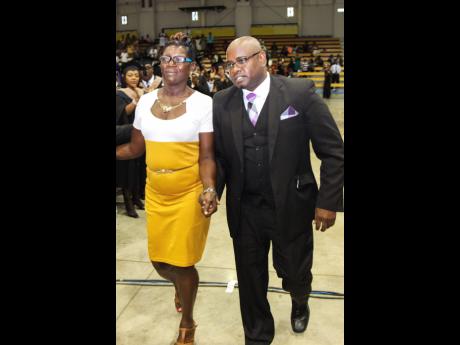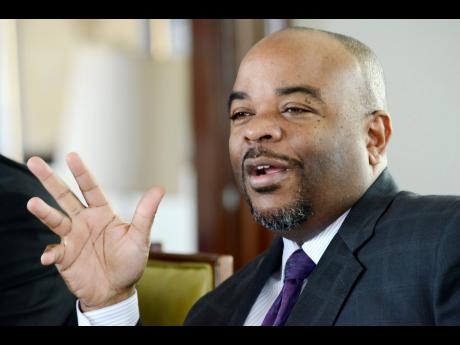Terrence Williams: Clean cops have no fear of INDECOM
To tackle crime, we need a professional police force that enjoys broad public support. This public support can only come where there is a widespread perception that corrupt and oppressive conduct will be detected and corrected, rather than condoned.
We should not give any store to any argument that pointing out possible oppressive and corrupt conduct erodes the morale of the force. It is the misconduct that erodes the morale, not the investigation of the misconduct.
In 2008, a Strategic Review of the Jamaica Constabulary Force (JCF) was done by the Ministry of National Security with international experts, local experts, and members of the force. They found that:
a. The police in Jamaica were distant from the community because of general distrust and perceptions of corruption, and this distrust hinders police investigations.
b. One of the dominant cultures in the JCF was one of corruption.
c. The squad culture reigned in the JCF where some members will always respond to the needs of someone they were trained with, even if it meant violating ethical or legal boundaries.
d. Jamaicans, no matter their background, wanted a more trusting relationship with their police force. They wanted to be treated with respect for human rights and to see corruption eradicated.
e. In a democracy, a police service is best able to carry out its functions when the members enjoy the respect and confidence of the population.
f. The JCF lost much support because of the actions of some of its members.
They pointed to certain endemic corrupt acts and practices, to include: contract killings, engaging with gangs, planting evidence, trafficking in weapons, and extortion. They said that these practices will take many years to be eradicated.
That Strategic Review recommended that INDECOM be formed, as the previous investigative bodies lacked sufficient authority to compel the police to cooperate and that there was a conflict of interest with the police investigating their colleagues.
Killings by police
In Jamaica, before last year, we averaged 200 police-involved fatalities every single year for a decade. Last year, it went even below 150. This year, at the mid-year mark, there were 50 killings involving the police.
Some persons are saying that this decrease in police shootings is somehow affecting the police in how they do their work. The police in Jamaica have very good principles. Deadly force must be used as a last resort. It must be reasonably proportionate in defending yourself or defending others. If the rate of fatal shootings has declined, it must be that they are organising themselves in a better way to limit, as much as is in their power, resort to deadly force.
It could not mean that they are not defending themselves or defending others. It could not be that they are sitting in the station and not leaving when required to do so. If it were so, we would have heard that, and there would be, I am sure, disciplinary action against them. It is not clear to me how respect for life, how obeying your own principles of using deadly force can cause you to be ineffective.
In the next five years of INDECOM, we intend to reach out to the good men and women of the JCF, of which they are many, to attempt at reaching understanding about the work of INDECOM and to make this connection as to how fostering public trust in the force will assist them in their jobs. Despite the abundance of truth and understanding, it is troubling that sometimes falsehood and misunderstanding still find a way to intervene.
It is said by some influential police officers that INDECOM takes away the rights of police officers and that we have charged police officers who have exercised their constitutional right not to self-incriminate. Both assertions are false. The INDECOM Act does not currently compel any self-incrimination. When a police officer is asked to give a statement, the document on which we request the statement from him tells him that he cannot be compelled to give any answer which will incriminate him. When they come to INDECOM before we question them, the first thing we tell them is that they cannot be compelled to answer any question which incriminates them.
The issue went before the Constitutional Court here in Jamaica. The unanimous decision was that there was no breach of constitutional rights.
Fighting INDECOM
Falsehood foments dissent in the force, encourages disregard for the laws of Jamaica, and sets back any attempt to make the relationship between INDECOM and the police better.
Some members of the JCF were not in support of the powers that INDECOM currently has and they lobbied for INDECOM not to have those powers. After the act was passed, they lobbied for those powers to be taken away. Parliament did not agree with them. They took the matter to court, hopeful of a ruling that these powers are unconstitutional or unlawful. The court did not agree with them.
After you have taken the steps to lobby for change and the change has not come; you have taken the step to take it to court and you have lost the case in court; the time now comes to comply with the law. You cannot be part of a disciplined organisation and try to encourage your members to disregard the law or to try to weaken their resolve by falsehood and fearmongering. This, more than anything else, may lower morale in the force. It is now time to recognise that INDECOM is the law of the land and for there to be compliance.
We hope that members of the force will commit themselves to proper conduct, the kind that led many of them to join the force. We hope that members of the force will feel that they can report their colleagues when their colleagues have acted improperly. You must feel no compulsion to cover up or to lie. Let the public regard you as a service to Jamaica. Let the public have pride in the police force and, with that confidence, the public will support the force.
The vast majority of Jamaicans want a society of peace and order, and with the JCF being a proud and disciplined organisation, they will fall behind you. This is achieved by detecting and correcting improper conduct and by improving policies and practices.
UPHOLD THE LAW
INDECOM seeks to enforce the laws of Jamaica and the rules of the JCF. When we investigate and seek to enforce these laws, there is no need for you, who seek to obey the laws and abide by the policies of the force, to feel any anxiety. If you join to serve and uphold the law, a full investigation of your actions should not deter you. Be proud of your service and of the noble reasons why you joined the force. Let no one distract you from it.
It is the members who engage in improper conduct who can lower morale. Speak out against them. It is falsehood that can lower morale. Instead, propagate truth.
Public support comes from public trust. Make the connection.
- Terrence Williams is commissioner of the Independent Commission of Investigations. The above address was excerpted from a speech to the Rotary Club of Mandeville on August 11. Email feedback to columns@gleanerjm.com and terrence.williams@indecom.gov.jm.


